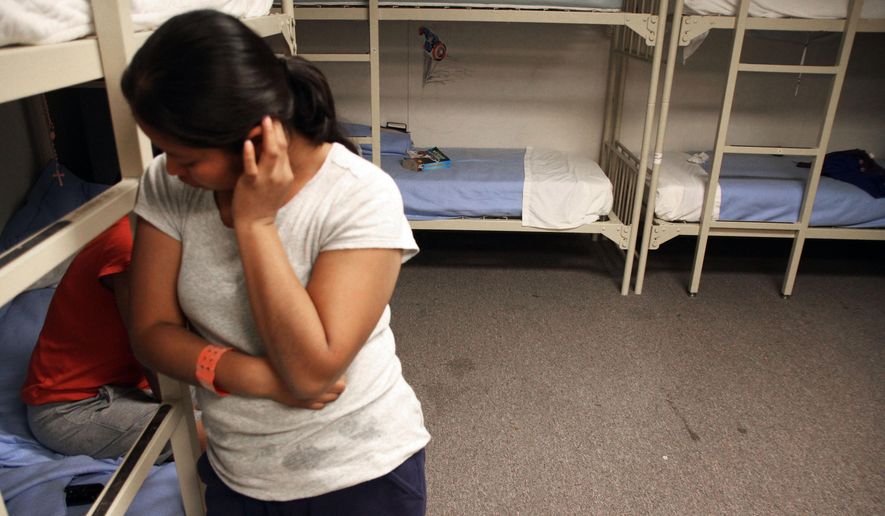LOS ANGELES (AP) — Most of the nearly 60,000 Central American children who have arrived on the U.S.-Mexico border in the last year still don’t have lawyers to represent them in immigration court, and advocates are scrambling to train volunteer attorneys to help cope with the massive caseload.
With the number of unaccompanied immigrant children more than doubling this past fiscal year, the need for attorneys has surged, and it has been exacerbated by the immigration courts’ decision to fast-track children’s cases, holding initial hearings within a few weeks instead of months.
Immigrants can have counsel in immigration courts, but lawyers are not guaranteed or provided at government expense. Having an attorney can make a big difference: While almost half of children with attorneys were allowed to remain in the country, only 10 percent of those without representation were allowed to stay, according to an analysis of cases through June by the Transactional Records Access Clearinghouse at Syracuse University.
Efforts are underway from White Plains, New York, to New Orleans to train attorneys at private law firms on the country’s byzantine immigration laws and how to work with traumatized, Spanish-speaking children, many of whom are fleeing violence - a far cry from the corporate clients most deal with on a daily basis.
“We’re doing pretty well on finding willing lawyers. We’ve got to get them trained, we’ve got to get them matched to that child,” said Reid Trautz, director of the American Immigration Lawyers Association’s practice and professionalism center. “It just takes time.”
Last month, Vice President Joe Biden urged lawyers to increase efforts to take on the children’s cases. Since then, the cities of San Francisco and New York have each announced plans to allocate roughly $2 million to help provide more lawyers for unaccompanied minors. California has appropriated $3 million toward the effort.
About 800 immigration lawyers have signed up to volunteer on the cases, the immigration lawyers association said.
So have many other attorneys without any background in immigration law. They are being trained and paired with experienced immigration practitioners, who serve as mentors.
“We’ve had tax lawyers do this, corporate lawyers, real estate - anybody can do it,” said Ricardo Martinez-Cid, president of the Cuban American Bar Association, which started a program earlier this year to represent unaccompanied children in Miami.
Immigrant advocates say the efforts are working, but not as quickly as desired. Nonprofit organizations have been boosting staff, but there aren’t enough experienced immigration lawyers to take on the cases or to mentor volunteers. Nor is there enough long-term funding for cases that can take more than a year to resolve, they said.
“It is very much a triage situation, and it is very, very frustrating because you know when someone calls and you turn them away, it is very unlikely they’ll find counsel,” said Judy London, directing attorney of the immigrants’ rights project at Los Angeles-based Public Counsel.
Some children will apply for green cards under a federal program for abused and abandoned children, while others who came fleeing violence in El Salvador, Honduras and Guatemala are seeking asylum.
One of the biggest challenges for volunteer lawyers is getting clients to open up about their lives when they have been beaten, raped or seen friends and family killed.
Three of the 30 children whose cases are being handled by Public Counsel have a history of suicide attempts or risk of suicide, London said. Most children are not going to feel comfortable walking into a fancy law firm and would probably run from the building, she said, unless an attorney meets the child outside and walks jointly through the door.
Jack Ross, an attorney in Southern California, said he met with a 16-year-old client four times before he told his full story. The boy, who arrived in the country two years ago, fled years of violence from his father and a police department that refused to protect him, he said.
“It’s some of the most compelling legal work you can do, because the stakes are so high,” said Ross, who represents hospitals and care providers in negligence claims and contract disputes. “You become so emotionally invested in the client, their well-being is really at the forefront of everything, and that doesn’t happen a lot in law.”
Before the recent influx of unaccompanied children, only about half were represented, said Wendy Young, president of Kids in Need of Defense, a nonprofit that pairs volunteer lawyers with children. She could not say how many children now have lawyers, but said certainly fewer than before.
Advocates have sued to demand the government provide the children with attorneys at the government’s expense. The lawsuit is pending before a judge in Seattle.
They say children with representation are more likely to attend their court hearings.
This week, the Homeland Security Department acknowledged that tens of thousands of young families caught on the border failed to meet with federal immigration agents as instructed. A spokeswoman for Immigration and Customs Enforcement said she could not say whether they attended court hearings on their cases.
At a recent immigration court hearing in Los Angeles, most of the 19 children whose cases were scheduled showed up. Seven had attorneys. Others were accompanied by a relative, as the judge reviewed their names and ages.
Their guardians were given a handout with a list of low-cost legal service providers and told to return in December with a lawyer.




Please read our comment policy before commenting.